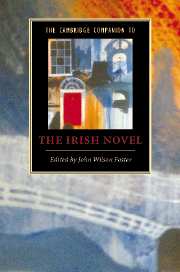Book contents
- Frontmatter
- Introduction
- 1 The novel before 1800
- 2 The national tale and allied genres, 1770s-1840s
- 3 The novel of the big house
- 4 The Gothic novel
- 5 Catholics and fiction during the Union, 1801-1922
- 6 Irish modernisms, 1880-1930
- 7 James Joyce
- 8 Region, realism and reaction, 1922-1972
- 9 The novel in Irish
- 10 Women novelists, 1930s-1960s
- 11 Two post-modern novelists: Samuel Beckett and Flann O’Brien
- 12 Life writing in the twentieth century
- 13 The novel and the Northern Troubles
- 14 Contemporary Irish fiction
- Index
5 - Catholics and fiction during the Union, 1801-1922
Published online by Cambridge University Press: 28 January 2007
- Frontmatter
- Introduction
- 1 The novel before 1800
- 2 The national tale and allied genres, 1770s-1840s
- 3 The novel of the big house
- 4 The Gothic novel
- 5 Catholics and fiction during the Union, 1801-1922
- 6 Irish modernisms, 1880-1930
- 7 James Joyce
- 8 Region, realism and reaction, 1922-1972
- 9 The novel in Irish
- 10 Women novelists, 1930s-1960s
- 11 Two post-modern novelists: Samuel Beckett and Flann O’Brien
- 12 Life writing in the twentieth century
- 13 The novel and the Northern Troubles
- 14 Contemporary Irish fiction
- Index
Summary
Catholicism and the novel
During the funeral of Mrs Daly in The Collegians (1829), Gerald Griffin's narrator notes that 'two or three clergymen made their appearance and were, with difficulty, accommodated with places'. Griffin was a Catholic and was later to join a religious order, yet there is little direct reference to Catholic life in The Collegians. The novel's reticence about religious practice belies its theme of Ascendancy decadence and rising Catholic leadership in rural Irish society, but is typical of the treatment of religion by mainstream Catholic writers.
The nineteenth century witnessed a 'devotional revolution', an extraordinary growth in the institutional cohesion of the Catholic Church in Ireland and in the conformity of ordinary Irish Catholics to orthodox religious practice. However, this was not matched by an assertive advocacy of Catholicism in fiction, except by a number of literary priests who had international experience of the struggle between Catholicism and modernity. Ireland also experienced modernisation, largely as a result of changes to the land system, but it was of a special form which favoured the farming family rather than the urban individual. Its emphasis on collective - or at least family - identity rather than on individual identity created a favourable environment for the Church. The Irish Catholic cultural environment thus diverged from the European mainstream in which urban experience and the triumph of individual experience were prized, especially in fiction.
- Type
- Chapter
- Information
- The Cambridge Companion to the Irish Novel , pp. 97 - 112Publisher: Cambridge University PressPrint publication year: 2006
- 3
- Cited by

